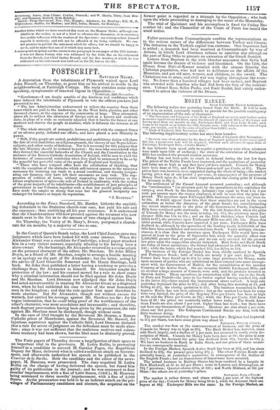In the Court of Queen's Bench today, the Lord Chief
Justice gave two judgments which have been looked for with some interest. When Sir Alexander Grant was a candidate for Cambridge, a local paper attacked him in a very violent manner, especially alluding to his having been a slave-owner. On the hustings, Sir Alexander retorted by a coarse attack on the personal character of the editor, Mr. Sheehan. Sir John Milley Doyle, as a friend of Mr. Sheehan, sought to arrange a hostile meeting or an apology on the part of Sir Alexander ; but the latter, acting by the advice of Lord Granville Somerset and Sir Henry Hardinge, held back. Sir John then published a letter having a tendency to provoke a challenge from Sir Alexander to himself. Sir Alexander sought the protection of the law ; and his counsel moved for a rule to show cause why a criminal information should not be filed against Sir John Doyle and Mr. Sheehan, Lord Denman now adjudged that Sir John Doyle had acted unwarrantably in treating Sir Alexander Grant as a disgraced man, when he had submitted his case to two of the most honourable men in the kingdom; and that the rule against him must therefore be SHade absolute. But Sir Alexander, though not without excuse for warmth, had carried his revenge against Mr. Sheehan too far ; for his vague insinuation, that he could bring proof of the worthlessness of the other's character, was most scandalous and inexcusable ; and therefore, such flagrant provocation having been given by the prosecutor, the rule against Mr. Sheehan must be discharged, though without costs.
In the case of libel brought by the Reverend Mr. Hearne, a Roman Catholic priest of Manchester, against the Reverend Mr. Stowell, for injurious aspersions against the Catholic faith, Lord Denman declared that a rule for arrest of judgment on the defendant must be made abso- lute; since it was not sufficient that the malicious motives and calum- nious tendency had been shown, but the libel must be distinctly proved.


























 Previous page
Previous page